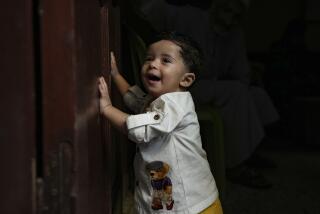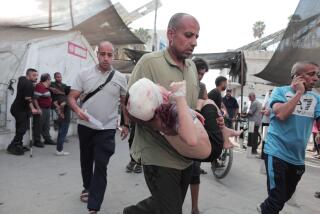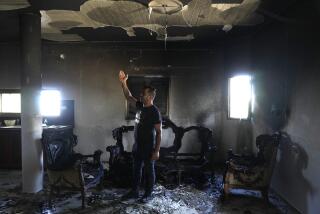Israeli Troops Kill Boy, 11, in West Bank
JERUSALEM — For the second time in two days, Israeli troops Sunday fatally shot a Palestinian child, this one a boy of 11 who was killed when soldiers fired on a crowd of young stone-throwers in the northern West Bank town of Tulkarm.
On Saturday, a 9-year-old Palestinian girl was killed outside her home in the Khan Yunis refugee camp in the Gaza Strip.
Palestinian witnesses said the slain boy, Abdel Karim Salameh, was part of a crowd of students walking home from school. Some of the boys threw stones at a passing army vehicle, and the soldiers opened fire, the witnesses said.
Tulkarm, like most other major West Bank cities and towns, has been under an intermittent Israeli military curfew for the last several months. The curfew was lifted for some hours Sunday, and the streets were filled with Palestinians going to work and school, shopping and visiting family members.
The army said that a “violent riot” broke out in the late morning in the eastern part of town and that its troops responded with nonlethal means -- a term generally used to characterize crowd control measures such as tear gas, stun grenades and rubber-coated steel bullets.
However, the director of the town’s hospital, Dr. Ahmed abu Bakar, said the boy was killed by a live bullet to the head. A second 11-year-old was hit in the leg with a rubber bullet in the same incident, he said.
“This army has no principles or ethics -- it was a direct hit to kill this boy,” said the governor of Tulkarm, Izzedine Sharif.
The army said it was investigating the shooting.
The boy’s death was the latest in a string of child fatalities over the last several weeks. Earlier this month, four Palestinians under the age of 16 were killed in the course of a single week in the Gaza Strip.
Human rights groups, including the Israeli organization B’Tselem, say the number of Palestinian minors killed in 27 months of violence has exceeded 300. Palestinians say the figure is higher than that.
Tulkarm, which lies close to the Green Line dividing the West Bank and Israel, has been the home base of many suicide bombers and others who have launched attacks against Israelis.
As elsewhere in the West Bank, Israeli soldiers operating in Tulkarm have carried out an aggressive campaign of arrests -- and sometimes killings -- of Palestinian militants, coupled with demolitions of homes belonging to families of those who have carried out attacks.
More than 1,200 Palestinians have been arrested in such raids over the last two months, Defense Minister Shaul Mofaz told fellow Cabinet ministers Sunday, in what has been one of the largest sweeps in memory.
In the southern West Bank, Israeli troops Sunday arrested three members of Islamic Jihad, which claimed responsibility for killing four Jewish seminary students in a shooting attack Friday night, hours after the start of the Jewish Sabbath. The army said the three arrested men were believed to belong to the same cell that carried out the attack on the yeshiva, or religious seminary, at the settlement of Otniel, outside the city of Hebron.
Sunday’s Cabinet meeting brought a brief but highly unusual debate over targeted killings of Palestinian militants -- not over the legality or morality of the practice, but over whether it serves mainly to provoke more violence.
The attack at Otniel came one day after nine Palestinians died at the hands of Israeli troops in a 24-hour period. Several of those deaths bore the hallmarks of what Israel calls “pinpoint” killings of militants. Among the dead was a local leader of Islamic Jihad, which vowed it would exact revenge.
Israeli government sources and media reports said that during the closed-door Cabinet gathering, Atty. Gen. Elyakim Rubinstein pointed to the Otniel attack -- and the fact that it came on the heels of the deaths of several militant leaders -- in arguing that targeted killings should be only a last resort.
Human rights groups estimate that about 90 such killings, which the Palestinians call assassinations, have taken place since the current intifada began in September 2000.
According to people present at the Cabinet meeting, Prime Minister Ariel Sharon strongly defended a range of tactics, including mass arrests and targeted killings, that his government says are meant to preempt Palestinian attacks inside Israeli cities and towns.
The latest military crackdown in the West Bank has corresponded with more than a month of relative calm inside Israel, but in the past, gruesome suicide attacks have occasionally occurred even during times of stringent clampdowns.
Also Sunday, in the Gaza Strip, Israeli soldiers fired toward a group of protesters approaching a military checkpoint near the settlement bloc of Gush Katif. A Palestinian cameraman on assignment for Associated Press Television News was injured when his head was grazed by a bullet, the news agency reported.
More to Read
Sign up for Essential California
The most important California stories and recommendations in your inbox every morning.
You may occasionally receive promotional content from the Los Angeles Times.










